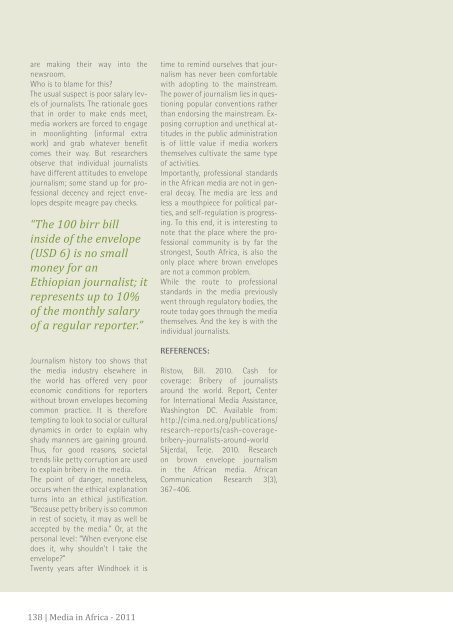Twenty years after the Windhoek Declaration on press freedom
Twenty years after the Windhoek Declaration on press freedom
Twenty years after the Windhoek Declaration on press freedom
Create successful ePaper yourself
Turn your PDF publications into a flip-book with our unique Google optimized e-Paper software.
are making <str<strong>on</strong>g>the</str<strong>on</strong>g>ir way into <str<strong>on</strong>g>the</str<strong>on</strong>g><br />
newsroom.<br />
Who is to blame for this?<br />
The usual suspect is poor salary levels<br />
of journalists. The rati<strong>on</strong>ale goes<br />
that in order to make ends meet,<br />
media workers are forced to engage<br />
in mo<strong>on</strong>lighting (informal extra<br />
work) and grab whatever benefit<br />
comes <str<strong>on</strong>g>the</str<strong>on</strong>g>ir way. But researchers<br />
observe that individual journalists<br />
have different attitudes to envelope<br />
journalism; some stand up for professi<strong>on</strong>al<br />
decency and reject envelopes<br />
despite meagre pay checks.<br />
“The 100 birr bill<br />
inside of <str<strong>on</strong>g>the</str<strong>on</strong>g> envelope<br />
(USD 6) is no small<br />
m<strong>on</strong>ey for an<br />
Ethiopian journalist; it<br />
represents up to 10%<br />
of <str<strong>on</strong>g>the</str<strong>on</strong>g> m<strong>on</strong>thly salary<br />
of a regular reporter.”<br />
Journalism history too shows that<br />
<str<strong>on</strong>g>the</str<strong>on</strong>g> media industry elsewhere in<br />
<str<strong>on</strong>g>the</str<strong>on</strong>g> world has offered very poor<br />
ec<strong>on</strong>omic c<strong>on</strong>diti<strong>on</strong>s for reporters<br />
without brown envelopes becoming<br />
comm<strong>on</strong> practice. It is <str<strong>on</strong>g>the</str<strong>on</strong>g>refore<br />
tempting to look to social or cultural<br />
dynamics in order to explain why<br />
shady manners are gaining ground.<br />
Thus, for good reas<strong>on</strong>s, societal<br />
trends like petty corrupti<strong>on</strong> are used<br />
to explain bribery in <str<strong>on</strong>g>the</str<strong>on</strong>g> media.<br />
The point of danger, n<strong>on</strong>e<str<strong>on</strong>g>the</str<strong>on</strong>g>less,<br />
occurs when <str<strong>on</strong>g>the</str<strong>on</strong>g> ethical explanati<strong>on</strong><br />
turns into an ethical justificati<strong>on</strong>.<br />
“Because petty bribery is so comm<strong>on</strong><br />
in rest of society, it may as well be<br />
accepted by <str<strong>on</strong>g>the</str<strong>on</strong>g> media.” Or, at <str<strong>on</strong>g>the</str<strong>on</strong>g><br />
pers<strong>on</strong>al level: “When every<strong>on</strong>e else<br />
does it, why shouldn’t I take <str<strong>on</strong>g>the</str<strong>on</strong>g><br />
envelope?”<br />
<str<strong>on</strong>g>Twenty</str<strong>on</strong>g> <str<strong>on</strong>g>years</str<strong>on</strong>g> <str<strong>on</strong>g>after</str<strong>on</strong>g> <str<strong>on</strong>g>Windhoek</str<strong>on</strong>g> it is<br />
138 | Media in Africa - 2011<br />
time to remind ourselves that journalism<br />
has never been comfortable<br />
with adopting to <str<strong>on</strong>g>the</str<strong>on</strong>g> mainstream.<br />
The power of journalism lies in questi<strong>on</strong>ing<br />
popular c<strong>on</strong>venti<strong>on</strong>s ra<str<strong>on</strong>g>the</str<strong>on</strong>g>r<br />
than endorsing <str<strong>on</strong>g>the</str<strong>on</strong>g> mainstream. Exposing<br />
corrupti<strong>on</strong> and unethical attitudes<br />
in <str<strong>on</strong>g>the</str<strong>on</strong>g> public administrati<strong>on</strong><br />
is of little value if media workers<br />
<str<strong>on</strong>g>the</str<strong>on</strong>g>mselves cultivate <str<strong>on</strong>g>the</str<strong>on</strong>g> same type<br />
of activities.<br />
Importantly, professi<strong>on</strong>al standards<br />
in <str<strong>on</strong>g>the</str<strong>on</strong>g> African media are not in general<br />
decay. The media are less and<br />
less a mouthpiece for political parties,<br />
and self-regulati<strong>on</strong> is progressing.<br />
To this end, it is interesting to<br />
note that <str<strong>on</strong>g>the</str<strong>on</strong>g> place where <str<strong>on</strong>g>the</str<strong>on</strong>g> professi<strong>on</strong>al<br />
community is by far <str<strong>on</strong>g>the</str<strong>on</strong>g><br />
str<strong>on</strong>gest, South Africa, is also <str<strong>on</strong>g>the</str<strong>on</strong>g><br />
<strong>on</strong>ly place where brown envelopes<br />
are not a comm<strong>on</strong> problem.<br />
While <str<strong>on</strong>g>the</str<strong>on</strong>g> route to professi<strong>on</strong>al<br />
standards in <str<strong>on</strong>g>the</str<strong>on</strong>g> media previously<br />
went through regulatory bodies, <str<strong>on</strong>g>the</str<strong>on</strong>g><br />
route today goes through <str<strong>on</strong>g>the</str<strong>on</strong>g> media<br />
<str<strong>on</strong>g>the</str<strong>on</strong>g>mselves. And <str<strong>on</strong>g>the</str<strong>on</strong>g> key is with <str<strong>on</strong>g>the</str<strong>on</strong>g><br />
individual journalists.<br />
REFERENCES:<br />
Ristow, Bill. 2010. Cash for<br />
coverage: Bribery of journalists<br />
around <str<strong>on</strong>g>the</str<strong>on</strong>g> world. Report, Center<br />
for Internati<strong>on</strong>al Media Assistance,<br />
Washingt<strong>on</strong> DC. Available from:<br />
http://cima.ned.org/publicati<strong>on</strong>s/<br />
research-reports/cash-coveragebribery-journalists-around-world<br />
Skjerdal, Terje. 2010. Research<br />
<strong>on</strong> brown envelope journalism<br />
in <str<strong>on</strong>g>the</str<strong>on</strong>g> African media. African<br />
Communicati<strong>on</strong> Research 3(3),<br />
367–406.












